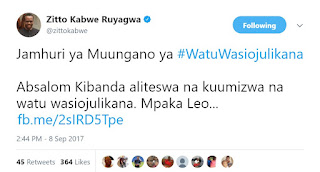Beyond the selfies and glamourized life
What for many is not obvious in a more advanced economy is
that social media in a country like Tanzania is not only social media but it is
MEDIA. Big difference! Because the Whatsapp app on the phone is not for talking
to Granny or Mom but it is a business networking tool. Instagram is not a platform
to post (only) selfies at weddings and parties, but a free advertising
platform. Twitter is a great platform to vent and share ideas about politics
and current affairs but also to provide essential free information on important
issues. Facebook allows marketing of goods and now even has added the “shop” function
but for many Tanzanians selling their artisanal goods or services, their
personal Facebook pages are still the first and foremost tool for earning a
living.
Of course no proper writing misses the opportunity to share
anecdotes, living examples etc. But cynicisms aside I have personally so many
inspirational examples of young people who reached out to me and said: “Hey
Sis, this is what I do! How can I improve, get more clients... etc.”
There is Idris who makes charcoal from recycled waste in
Tabora and who has taken to Twitter to share his knowledge and market his
business. He is now taking orders from many parts of Tanzania, and has other
young people helping him produce this environment friendly charcoal.
Then there is Bright who has a passion for tailoring and
dreams to become the Yves Saint Laurent of Africa, now dressing Members of
Parliament and celebrities after reaching out to a number of us for advice.
And then you have Agnes who makes beautiful accessories from
local beads and fabrics – who now has developed to selling and displaying at
major fairs and sales.
I talk of them because there are those who also became
successful selling imported goods but I see the value of these young people as
they could grow to become major businesses that would add to the value chain
and increase local content on the market.
This may seem novel and groundbreaking but it is simply
about the extraordinary opportunity that social media has offered the millions
of young Tanzanians who are mostly unemployed or recent graduates. So what we see
now is powerful personal accounts that have considerable following with decent
digital marketing skills selling services, ideas and products. How can these
individual efforts and personal creativity and enthusiasm be channeled to
something bigger and more transformational? First and foremost by making
starting a business easier and reducing the cost of doing business. If any
young person is interested in starting up officially a business, they will fast
find themselves spending the little capital they have, on paying license fees
and - something that many parts of the world has not heard of – provisional tax
(in short you are estimated to make for example 3 million shillings profit per
annum and you have to pay 30% tax on that provisionally. You have not seen a
single cent but hey! Pay up in advance!)
As I attend all these fancy workshops and conferences on
business in Tanzania, I wonder if ever the men and women in suits (me included)
have ever thought of discussing social media entrepreneurship as a “serious”
area worth exploring. Instead of forcing these budding businesses to become
NGOs in order to gain access to capital in the form of grants, maybe it is time
to think more seriously in Tanzania about what has become the buzzword now in the
West “social entrepreneurship”. But not in the usual “we-know-better-and-here-is-what-we-think-you-can-do
manner” but more in “we-have-money-tell-us-how-we-can-help-you” approach.
I would love to see Idris in Tabora and his charcoal from
recycled waste, or Agnes and her beautiful accessories from local fabrics and
beads, or Bright and his exceptional suits, getting proper investment and
financial advice. Western style venture capital may not be easy to get but we
definitely need to come up with better solutions for that. Because at the end
of the day we #ChangeTanzania if we start changing our thinking and approach to
matters.





